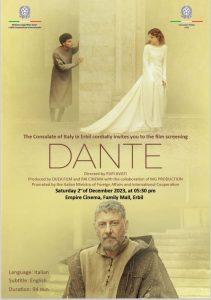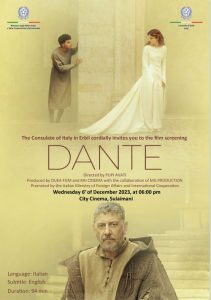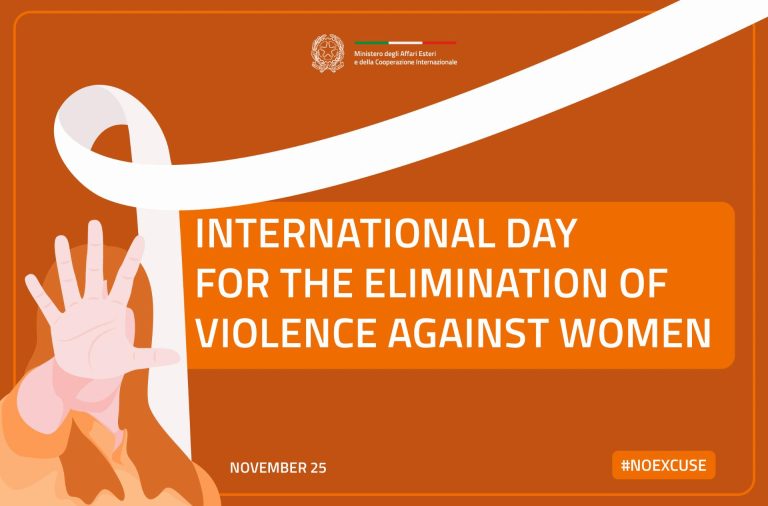The Italian Consulate cordially invites to the screening of the film “Dante” on:
Date: December,2,2023
Time: 5:30 pm
Venue: Empire Cinema, Family Mall, Erbil.
&
Date: December,6,2023
Time: 6:00 pm
Venue: City Cinema, Sulaimani.
Enclosed you will find the invitation/flyer. Free access and open to all.


SYNOPSIS
September 1350. Giovanni Boccaccio is commissioned to bring ten Gold Florins as symbolic compensation to Sister Beatrice, daughter of Dante Alighieri and a nun in Ravenna in the monastery of Santo Stefano of the Olive Trees.
Dante died in exile in 1321, while his fame, thanks to the reputation of his Comedy, has spread everywhere. His last twenty years were terrible, he was constantly on the run and seeking hospitality among various courts with a sentence of burning and beheading inflicted on him and his sons, who also fled from Florence.
Meanwhile, in the provincial capital of Tuscany, there is a balance of power profoundly changed, and the city seeks reconciliation, albeit posthumously, with a fellow citizen of such value. The ten florins would be the symbolic compensation for the confiscation of assets and for the sentence to be burnt alive and beheaded, decreed almost half a century earlier from the Florentine municipality. Against that part of the ecclesial world that considers the Comedy a diabolical work, Giovanni Boccaccio accepts this assignment in the belief of being able to carry out a deeper investigation regarding Dante, which allows him to narrate his life story and the injustices suffered.
In his long journey, Boccaccio, in addition to his daughter, will meet those, in the last years of the Ravenna exile, gave shelter and offered hospitality and those, in contrast, repelled and put the exile to flight. Through retracing from Florence to Ravenna a part of the Dante’s journey, stopping in the same convents, villages, castles, and same libraries, and questions that he asks and the answers he gets, Boccaccio reconstructs the life story of Dante to the point of being able to tell us his entire story.
The film tells the life of Dante Alighieri, a greater among the greaters, who is certainly the largest and best known in the world.
DIRECTOR’S NOTES
To have a glimpse of the possibility of telling human life story, who was Alighieri, was the discovery of the mission of Giovanni Boccaccio in 1350: going to Ravenna and giving the daughter of Dante a grant of ten florins to compensate her for the great harm that Florentines had done to his father. I, therefore, owe most of my narration to Boccaccio himself, who was Dante’s biographer granting him such a high reputation for generations.
The rest is the result of speculations and suggestions that come to me from twenty years of disparate readings and continuous consultation of the best Dante Scholars cited in the exergue. In reality, Dante had first entered my life through reading chroniclers of his time (Villani, Vellluti, Compagni, etc…), many wise men and women, and many academic and non-academic biographies. Those readings convinced me of his profound humanity, very blurry, which was even so explicit.
More or less in those years, I read “La Vita Nova”, that prosimeter of love that twenty-year-old Dante found himself writing the day in the aftermath of Beatrice Portinari’s death. Enough to make me recognize myself in most of the emotions of that remote young man, I would make my attempt to keep alive, through the sublimity of poetry, that celestial being that was for him Beatrice Portinari.
Poetry whose manifestation occurs in Dante through the sublimation of pain: the loss of his mother in his childhood, the death of Beatrice, condemnations to exile of his best friends, facing unjust damnation in a young age, and extended to his children. It is a confirmation of how much pain promotes humans to a higher level of knowledge.
Pupi Avati








